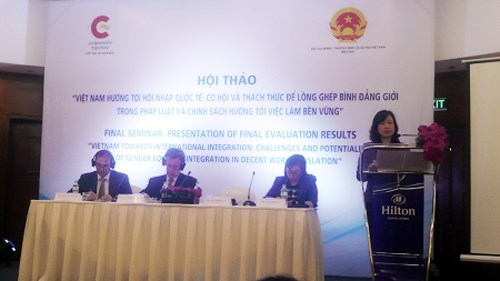 Society
Society

More than 1,400 State office workers, and 1,000 lecturers and students received training and access to technical documents about gender equality.
 |
| Đào Hồng Lan, deputy minister of Labour, Invalids and Social Affairs, delivers speech at a conference on Gender Equality Integration in Decent Work Legislation yesterday. — Photo qdnd.vn |
HÀ NỘI – More than 1,400 State office workers and 1,000 lecturers and students have received training and access to technical documents about gender equality under a project initiated by the Ministry of Labour, Invalids and Social Affairs (MOLISA) and the Spanish Agency for International Development Co-operation.
The project Gender Equality Integration in Decent Work Legislation, called for ensuring the rights of women in work policies and regulations, and to raise people’s awareness on gender equality. It focused on areas such as maternity leave, how to balance home and work life for women, and how to improve the salary gap between men and women.
A conference held yesterday in Hà Nội discussed the 2012-2016 project that aimed to bring gender equality into the process of implementing labour laws. It provided technical support and research for lawmakers compiling the Law on Social Insurance and Law on Vocational Education in 2014.
The project delivered educational documents and leaflets on the issue to the wider public. It also held several dialogues and conferences on gender equality and labour to support the country as it changes its laws to meet international commitments on the issue.
Việt Nam’s participation in the Trans-Pacific Partnership (TPP) agreement and EU-Việt Nam Free Trade Agreement was an opportunity for economic growth, said Lê Kim Dung, director of the International Co-operation Department under MOLISA. But they also challenged Việt Nam to assure that all people – men and women alike – benefited from that growth.
"The project aims to help the Government design laws that respect gender equality as Việt Nam integrates into the international community," she said.
Đào Hồng Lan, deputy minister of Labour, Invalids and Social Affairs, said gender equality was a big priority for the labour sector.
Effective management of labour offices at the local level would help ensure the genders were treated equally as policies were implemented, she said. — VNS




